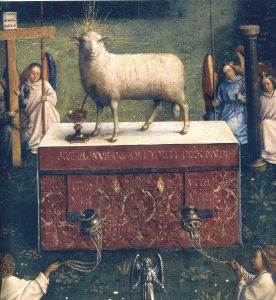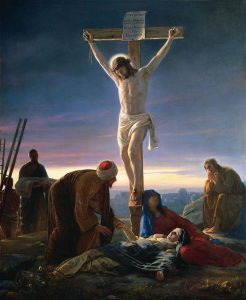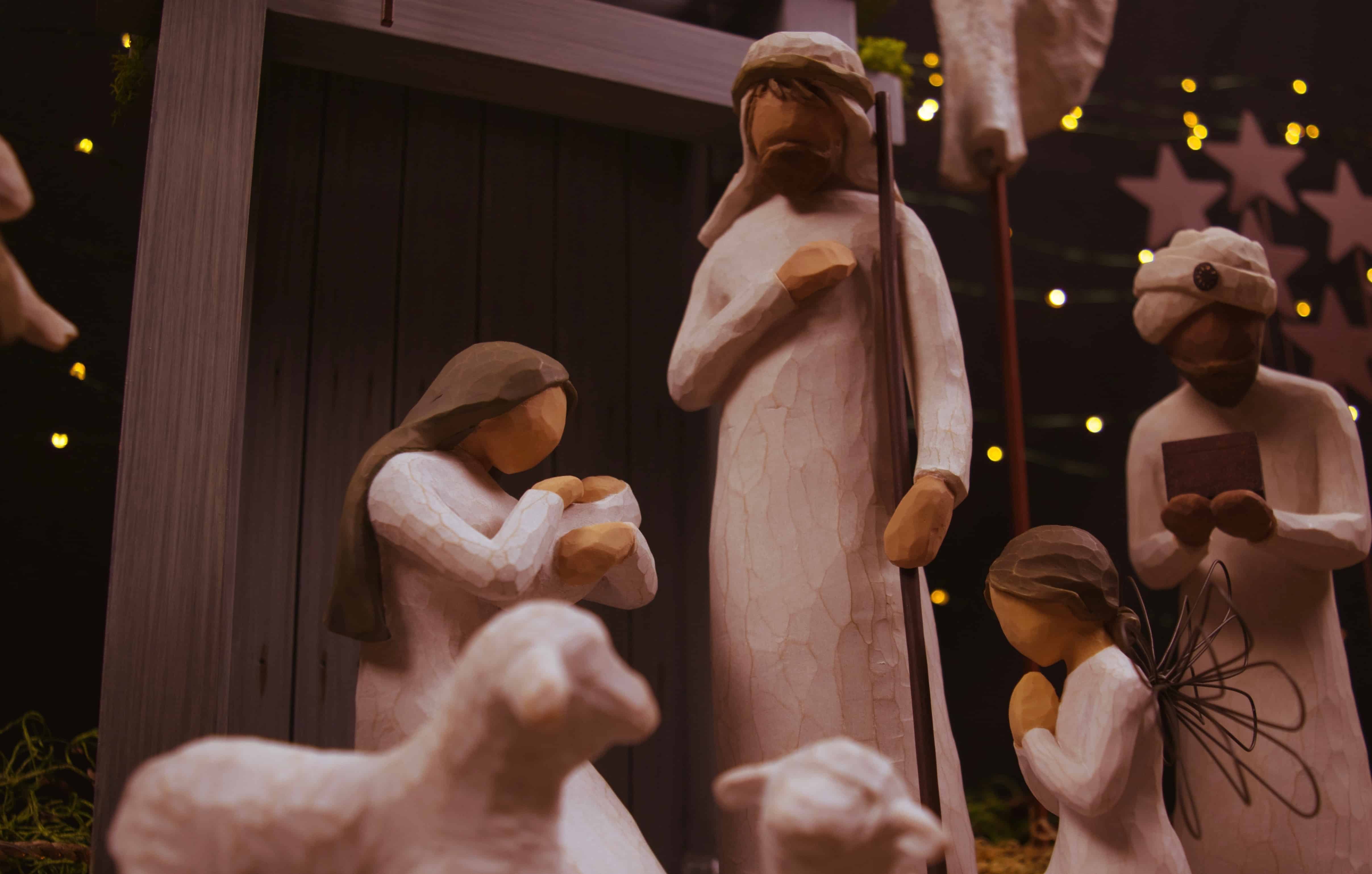All through the years and centuries God had been making it very clear that there was no way of coming to him in worship except by coming with a little lamb. And as men brought a lamb, they were to realize that the lamb was picturing a person who would one day come to die for their sins.…
Although a stable does not seem a good place for a king to be born, or even for and ordinary baby to be born, let alone the Son of God to be born, yet it is a perfect place for a lamb to be born.
—Francis and Edith Schaeffer1—

Key point: Properly understood, Christmas is a celebration, not just of Jesus’ birthday, but also of His life, ministry, death, burial, and resurrection. It also is a celebration of His profound impact on the world and on individual lives. Jesus changes everything!
Always Ready Ministries (ARM) is a new outreach organization recently created by Drake More and Alex St Onge, friends of mine and students at Cedarville University in Ohio. At present, the primary means of outreach for ARM is its website, www.alwaysreadyministires.org. I currently serve as the senior editor for ARM. In that role I have had the privilege of editing some excellent articles written by Cedarville students and others, including at least one Cedarville faculty member.
The Christmas posts at www.alwaysreadyministries.org (here and here) convey a very important message about Christmas for believers: Don’t just focus on the baby born in a manger, but also understand His arrival against the backdrop of the board sweep of world history, and more importantly, against the backdrop of God’s overtures to reunite humanity to Himself.
Don’t just focus on the baby born in a manger, but also understand His arrival against the backdrop of the board sweep of world history, and more importantly, against the backdrop of God’s overtures to reunite humanity to Himself.
Taking my cue from Steven Berringer, the author of ARM’s Christmas-themed articles this year, I have selected five passages of Scripture that typically don’t come to mind when we consider and reflect on Jesus’ birth. These passages speak of Christmas because they highlight God’s activity, not only in paving the way for His Son’s arrival, but also in saving and transforming those who believe in Christ for forgiveness and eternal life. Celebrating Jesus’ birth in the fullest sense means understanding and appreciating God’s work in the past, basking in His love and forgiveness in the present, and cooperating with the Holy Spirit here and now to make a profound difference in the world in the short-term, and in people’s lives throughout eternity.
Celebrating Jesus’ birth in the fullest sense means understanding and appreciating God’s work in the past, basking in His love and forgiveness in the present, and cooperating with the Holy Spirit here and now to make a profound difference in the world in the short-term, and in people’s lives throughout eternity.
1. 1 Timothy 3:14-16
14 These things I write to you, though I hope to come to you shortly; 15 but if I am delayed, I write so that you may know how you ought to conduct yourself in the house of God, which is the church of the living God, the pillar and ground of the truth. 16 And without controversy great is the mystery of godliness:
God was manifested in the flesh,
Justified in the Spirit,
Seen by angels,
Preached among the Gentiles,
Believed on in the world,
Received up in glory.
Theologian, author, and Bible teacher Warren Wiersbe indicates the indented portion likely was a quote from an early hymn of the church. The following statements summarize His insights regarding this passage.
- In Christ, “God was manifested in the flesh,” not only when Jesus was born, but also throughout His life and ministry (see John 14:7-11).
- The Holy Spirit “justified” or vindicated Jesus and His ministry through the miracles He did, including Jesus’ most powerful miracle, His resurrection (see John 10:22-39; Rom. 1:1-4). Moreover, the Holy Spirit validates Jesus’ work even today through His own ministry of conviction (see John 16:5-11).
- Angels certainly were involved in Jesus’ life and ministry but, as Wiersbe notes, the Lord did not die for them, but for people.
- Jesus’ message is not for the Jews only, but for everyone in the entire world! Accordingly, Jesus was, and has been, “preached among the Gentiles” so that He might be “believed on in the world.”
- At His ascension, which occurred after His resurrection and before the birth of the church at Pentecost, Jesus was “received up in glory.” One day He will return to earth as ruler and judge.2
These elements, Paul indicates, are involved in the “mystery of godliness.” Note that this mystery rests on what God did in and through Christ, and not one bit on what we have done. Even so, as believers, we have the responsibility and the privilege of cooperating with God so Christ’s work in our own lives might be evident in our spheres of influence.
2. 2 Timothy 1:7-12
7For God has not given us a spirit of fear, but of power and of love and of a sound mind.
8 Therefore do not be ashamed of the testimony of our Lord, nor of me His prisoner, but share with me in the sufferings for the gospel according to the power of God, 9 who has saved us and called us with a holy calling, not according to our works, but according to His own purpose and grace which was given to us in Christ Jesus before time began, 10 but has now been revealed by the appearing of our Savior Jesus Christ, who has abolished death and brought life and immortality to light through the gospel, 11 to which I was appointed a preacher, an apostle, and a teacher of the Gentiles. 12 For this reason I also suffer these things; nevertheless I am not ashamed, for I know whom I have believed and am persuaded that He is able to keep what I have committed to Him until that Day.
Look at this passage carefully and note just how many benefits believers have because of Christ!
- We have not been given a fearful spirit, but a spirit “of power and of love and of a sound mind.”
- We need “not be ashamed of the testimony of our Lord.”
- Our call from God doesn’t depend on anything we have done, but on Christ’s perfect work.
- Christ “has abolished death and brought life and immortality to light through the gospel.”
- Like Paul, we may suffer, but we can remain confident in Christ, that He will faithfully keep all His promises to us, including the promise of a home in heaven where we will live with Him forever (see John 14:1-6).
3. 1 Peter 1:18-21
18 knowing that you were not redeemed with corruptible things, like silver or gold, from your aimless conduct received by tradition from your fathers, 19 but with the precious blood of Christ, as of a lamb without blemish and without spot. 20 He indeed was foreordained before the foundation of the world, but was manifest in these last times for you 21 who through Him believe in God, who raised Him from the dead and gave Him glory, so that your faith and hope are in God.
Jesus’ arrival on earth and His life and ministry give real hope to Christians, especially those who are under persecution for their faith. In fact, Peter wrote 1 Peter “to Christians who were experiencing various forms of persecution, men and women whose stand for Jesus Christ made them aliens and strangers in the midst of a pagan society.”3

What hope did, and does, Jesus offer? His ministry and His death were and are powerful and effective to save! Moreover, His resurrection proves this to be true. Not only did God perform it, and not only did it give God glory, but it also insures that those who believe in Christ’s resurrection and rely on Him for their salvation are indeed believing in the one true God who sent Jesus on the ultimate rescue mission in the first place. As Chuck Colson declared, the
birth of Jesus is a glorious moment, and the manger scene brings comfort and joy and Christmas cheer. But it should also inspire a holy terror in us—that this baby is God incarnate, the King who came to set captives free, through His violent, bloody death on the cross as atonement for us, His unworthy subjects.
It’s through the Incarnation God sets His grand plan in motion. He invades planet Earth, establishing His reign through Christ’s earthly ministry. And then Christ leaves behind an occupying force, His Church, which is to carry on the work of redemption until His return and the kingdom’s final triumph.
Yes, we are to look at the manger, but also beyond it!
4. 1 John 1:1-3
1:1 That which was from the beginning, which we have heard, which we have seen with our eyes, which we have looked upon, and our hands have handled, concerning the Word of life— 2 the life was manifested, and we have seen, and bear witness, and declare to you that eternal life which was with the Father and was manifested to us— 3 that which we have seen and heard we declare to you, that you also may have fellowship with us; and truly our fellowship is with the Father and with His Son Jesus Christ.
John was a first-hand eyewitness to the person, life, and ministry of Jesus Christ. Every word in these verses resonates with authenticity. This passage reminds us of another statement the apostle John made, this one early in his Gospel. Having established that “the Word” existed in eternity past and that He was and is God, John declared,
10 He was in the world, and the world was made through Him, and the world did not know Him. 11 He came to His own, and His own did not receive Him. 12 But as many as received Him, to them He gave the right to become children of God, to those who believe in His name: 13 who were born, not of blood, nor of the will of the flesh, nor of the will of man, but of God.
14 And the Word became flesh and dwelt among us, and we beheld His glory, the glory as of the only begotten of the Father, full of grace and truth.
This is why Christ came; it is why He was born into the world!
5. 1 John 4:9-10
9 In this the love of God was manifested toward us, that God has sent His only begotten Son into the world, that we might live through Him. 10 In this is love, not that we loved God, but that He loved us and sent His Son to be the propitiation for our sins.
Christmas is about giving gifts because on the first Christmas, God gave the Ultimate Gift. Believe me—no one ever will be able to top this Gift! God the Father “sent His only begotten Son into the world, that we might live through Him.” Francis and Edith Schaeffer put it this way.

Do you know why we give gifts at Christmas? The real reason should be because we are so thankful that God gave us a gift, that we want to celebrate that by giving things to other people, as well as thinking of what we can do to show God our appreciation. We are told that God loved the world so much, that he gave his only Son—so that anyone who would believe in him (that means anyone who would believe what he said in words, and also who would believe that what he did was for them, too) would have everlasting life. What a gift! The first part of the gift is that the [divine] Trinity agreed to be separated for a time, so that Jesus could be born, and live and teach and help people to know about him, and then die [on a cross] so that anyone who would believe him could live.4

Billy Graham never forgot the cross, even at Christmas. He wrote that were it not for Jesus’ death, His birth would be meaningless and empty. Jesus’ birth by itself, separated from the Cross, “is a gift half-given.” A great many people find it distasteful to think about Jesus’ crucifixion at Christmas. Yet, if they fail to embrace both His birth and His death, they actually “rob themselves of the full joy of Christmas.”
Continuing, Francis and Edith Schaeffer explain why Billy Graham is correct—and they weren’t even trying to! Christmas brings good news because of all that Jesus accomplished—for our benefit!
The second part of the gift is that as Jesus died in the place of anyone who believes in him, then he gives his righteousness in place of their sins. It is as if we had a dirty cloth around our shoulders, covering us with filth and rags, and then someone came along with a snowy white table cloth and said, “Look, I’ll take the dirty cloth, and cover you with this sparkling white cloth.”…The gift of the white cloth is real because we are told that whoever believes and accepts what Jesus came to do for him has his sins taken away, and is covered with righteousness (that means the good things Jesus did). Then, on top of all that, he gives us everlasting life. Everlasting is for ever and ever. He promises us that his gift is a wonderful life ahead of us!5
God’s Invasion of Planet Earth to Save Humanity
There’s something else we must note about these passages—all five of them. Each one conveys the idea that God, in the form of His Son, invaded the earth to set it aright once more. The Greek word often translated manifested or was manifested is in each passage. The term means “made visible or made known.” Here is how it is used in each instance.
- 1 Timothy 3:14-16—verse 16: “God was manifested in the flesh” in and through Christ.
- 2 Timothy 1:7-12—verse 10: The purpose and grace of God were given to us in eternity past, but they have “now been revealed by the appearing of our Savior Jesus Christ , who has abolished death and brought life and immortality to light through the gospel.”
- 1 Peter 1:18-21—verse 20: Christ “was manifest in these last times for you….”
- 1 John 1:1-3—verse 2 (where the word appears twice): The Word of Life “was manifested, and we have seen, and bear witness, and declare to you that eternal life which was with the Father and was manifested to us.”
- 1 John 4:9-10—verse 9: “In this the love of God was manifested toward us, that God has sent His only begotten Son into the world, that we might live through Him.”
Here is a page showcasing all five of these passages in four different translations. The Greek word for was manifested also appears in a number of other passages in Scripture, but these convey the full message of Christmas quite well.
This Christmas, study these and other Bible passages that will help you remember the mission of Christ, even as you reflect on and celebrate His arrival at the manger.
May God’s richest blessings be yours this Christmas!
Copyright © 2018 by. B. Nathaniel Sullivan. All rights reserved.
Unless otherwise indicated, Scripture passages have been taken from the New King James Version®. Copyright © 1982 by Thomas Nelson, Inc. Used by permission. All rights reserved.
Notes:
1Francis and Edith Schaeffer, Everybody Can Know: Family Devotions from the Gospel of Luke, (Wheaton, IL: Tyndale House Publishers, 1984), 27,30.
2Warren Wiersbe, The Bible Exposition Commentary, New Testament, Volume 2, (Wheaton, IL: Victor Books, 1989), 223-224.
3Roger M. Raymer, “1 Peter,” in The Bible Knowledge Commentary, New Testament Edition, ed. by John F. Walvoord and Roy B. Zuck, (Wheaton, IL: Victor Books, 1983), 837.
4Francis and Edith Schaeffer, 35,37.
5Francis and Edith Schaeffer, 37.
top photo credit: Photo by Dan Kiefer on Unsplash

Be First to Comment